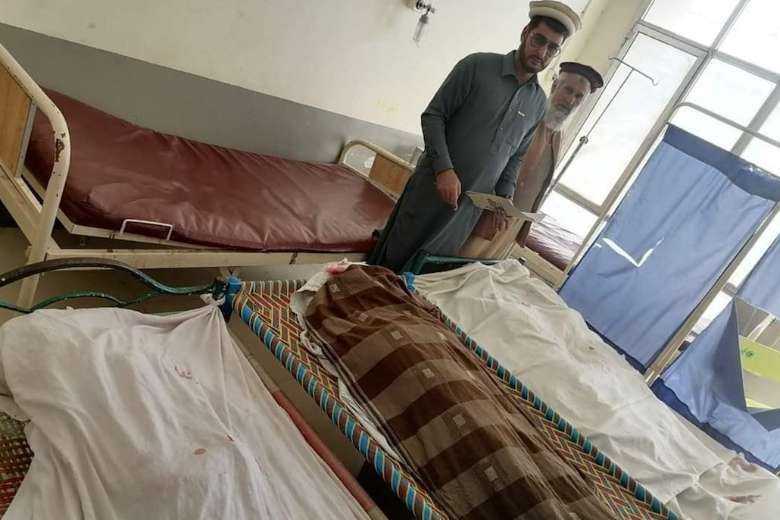
The bodies of four women aid workers lie in a hospital in Khyber Pakhtunkhwa province. The vocational trainers were shot dead by Taliban militants in North Waziristan district on Feb. 22. (Photo supplied)
Pastor Irfan James remembers losing his neighbor, a nurse, in a Taliban attack on a government convoy in 2008.
“She was travelling with three levies personnel [paramilitary law enforcement officers] in an ambulance to Peshawar [capital of Khyber Pakhtunkhwa province] for treatment of a local critically injured by a land mine.,” James told UCA News.
“A policeman survived by hiding beneath one of the dead bodies. Nobody expected an attack on the ambulance. The road remained closed until 2011 due to Taliban attacks. The locals used to enter Peshawar through neighboring Afghanistan.”
James, a missionary, hails from the tribal town of Kurram in the federally administered tribal areas (FATA), which consisted of seven tribal districts located on the Pakistan-Afghan border. FATA was previously under the direct rule of Pakistan’s federal authorities through a set of colonial-era laws known as the Frontier Crimes Regulation.
During the Taliban insurgency, formal education of girls was banned in the tribal areas from 2009 to 2012. Many females were forced to join seminaries. In 2015, the military secured the mountainous regions in the North and South Waziristan districts of FATA that served as the main base for local and foreign militants.
In 2018, Pakistan's parliament merged FATA, where militancy is rife, with neighboring Khyber Pakhtunkhwa province. However, fear of Taliban militants has resurfaced in North Waziristan, where four female vocational trainers were gunned down this week in Ipi village.
The women were from Sabawoon, a charity that provides training to women on how to run a business from home and works to create gender rights awareness. They had been visiting Mir Ali since December to teach handicrafts to Pashtun women in Ipi village.
According to police, one female aid worker survived the Feb. 22 ambush.
Many netizens took to social media to express anger over the attack.
“A real blow to women empowerment and visibility in the region. Taliban are back in the region,” stated Mona, a female activist, in a Feb. 22 tweet.
She said the vocational trainers were really poor women who would travel for three hours to the village for a monthly income of 16,000 rupees (US$101).
The Women’s Action Forum condemned the targeted killing in a statement issued the same evening.
“Civil society organizations and human rights defenders are already working under restrictive conditions, often risking their lives to simply do their work. Women human rights defenders face additional threats due to their gender and the patriarchal society at large,” it stated.
“We demand that the state take immediate action to conduct a transparent investigation into the incident and prosecute this case to the full extent of the law. We ask the local police and administration to avoid short-term, protectionist measures, such as restrictions on activities of NGOs, and focus on providing an enabling environment for civil society activities.”
Security forces on Feb. 23 killed Hassan alias Sajna, a member of the Taliban group that murdered the four women, during an intelligence-based operation in North Waziristan.
Cultural constraints
As in other parts of Pakistan, women are a particularly vulnerable segment of society in Khyber Pakhtunkhwa because of the strong patriarchal and tribal culture.
The militancy-plagued province has a tradition of banning women voters through local jirga (tribal court) laws enforcing local traditions and Sharia law. Most women in Khyber Pakhtunkhwa already practice purdah [seclusion] and wear burqas.
“Tribal women are already facing challenges in finding jobs. Their movement is restricted owing to local traditions. Now we have women police officers or female lawmakers. The cowardly attack on women activists is another blow to the already marginalized region,” said Pastor James.
Jirgas also sentence women to death for “dishonoring” a family or a tribe. These traditional courts are run by tribal and community elders primarily in rural areas, and civil society and human rights activists believe them to be historically detrimental to women’s rights.
Last month two universities in northern Pakistan banned T-shirts, short shirts, heavy makeup, jewelry, sleeveless shalwar kameez (traditional tunics with pleated trousers) and heavy handbags for females while on the campus.
The literacy rate in the seven tribal districts of Khyber Pakhtunkhwa, the erstwhile federal territories, is 33 percent compared with 59 percent for the rest of Pakistan and female literacy at 12 percent compared with 47 percent for the rest of the country.
According to the independent Human Rights Commission of Pakistan (HRCP), the highest number of child marriages was recorded in the tribal areas in 2019.
“Ninety nine percent of the girls are married under this traditional practice, which continues despite the existence of the Sindh Child Marriages Restraint Act ([that prohibits marriage of children under 18],” states the latest HRCP annual report.


